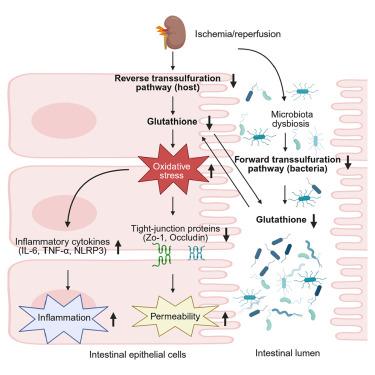Disruption of the transsulfuration pathway by acute kidney injury causes intestinal damage
IF 4.1
2区 综合性期刊
Q1 MULTIDISCIPLINARY SCIENCES
引用次数: 0
Abstract
Acute kidney injury (AKI) impairs intestinal function through oxidative stress. The transsulfuration pathway is essential for sulfur amino acid metabolism and antioxidant defense through glutathione biosynthesis. This study investigated how AKI caused intestinal injury and the mechanisms involved. AKI was induced in Sprague-Dawley rats through kidney ischemia (45 min)-reperfusion (24 h). AKI decreased intestinal glutathione (antioxidant) levels and compromised intestinal barrier function. Glutathione biosynthesis in mammals requires cysteine made through the reverse transsulfuration pathway, catalyzed by cystathionine beta-synthase (CBS) and cystathionine gamma-lyase (CSE). AKI decreased the expression of these enzymes in intestinal epithelium. AKI also altered gut microbiota composition and the expression of bacterial enzymes in the forward transsulfuration pathway, which could disrupt intestinal antioxidant defense. The inhibition of this pathway in gut epithelial cells reduced glutathione levels and tight junction protein expression. These results suggest that the disruption of the transsulfuration pathway impairs antioxidant defense, leading to intestinal barrier damage and dysbiosis in AKI.

急性肾损伤破坏转硫途径可引起肠道损伤
急性肾损伤(AKI)通过氧化应激损害肠道功能。转硫途径是通过谷胱甘肽生物合成硫氨基酸代谢和抗氧化防御所必需的。本研究探讨AKI如何引起肠道损伤及其机制。Sprague-Dawley大鼠通过肾缺血(45 min)-再灌注(24 h)诱导AKI。AKI降低了肠道谷胱甘肽(抗氧化剂)水平并损害了肠道屏障功能。哺乳动物的谷胱甘肽生物合成需要半胱氨酸通过反转硫途径合成,由胱硫氨酸-合成酶(CBS)和胱硫氨酸-裂解酶(CSE)催化。AKI降低了这些酶在肠上皮中的表达。AKI还改变了肠道菌群组成和前转硫途径中细菌酶的表达,从而破坏肠道抗氧化防御。该途径在肠上皮细胞中的抑制降低了谷胱甘肽水平和紧密连接蛋白的表达。这些结果表明,转硫途径的破坏损害了抗氧化防御,导致AKI肠屏障损伤和生态失调。
本文章由计算机程序翻译,如有差异,请以英文原文为准。
求助全文
约1分钟内获得全文
求助全文
来源期刊

iScience
Multidisciplinary-Multidisciplinary
CiteScore
7.20
自引率
1.70%
发文量
1972
审稿时长
6 weeks
期刊介绍:
Science has many big remaining questions. To address them, we will need to work collaboratively and across disciplines. The goal of iScience is to help fuel that type of interdisciplinary thinking. iScience is a new open-access journal from Cell Press that provides a platform for original research in the life, physical, and earth sciences. The primary criterion for publication in iScience is a significant contribution to a relevant field combined with robust results and underlying methodology. The advances appearing in iScience include both fundamental and applied investigations across this interdisciplinary range of topic areas. To support transparency in scientific investigation, we are happy to consider replication studies and papers that describe negative results.
We know you want your work to be published quickly and to be widely visible within your community and beyond. With the strong international reputation of Cell Press behind it, publication in iScience will help your work garner the attention and recognition it merits. Like all Cell Press journals, iScience prioritizes rapid publication. Our editorial team pays special attention to high-quality author service and to efficient, clear-cut decisions based on the information available within the manuscript. iScience taps into the expertise across Cell Press journals and selected partners to inform our editorial decisions and help publish your science in a timely and seamless way.
 求助内容:
求助内容: 应助结果提醒方式:
应助结果提醒方式:


